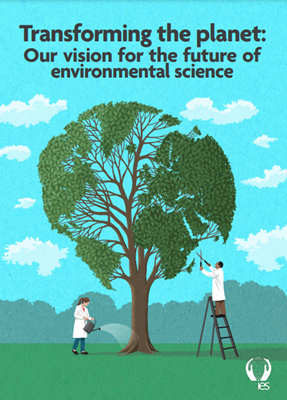Climate change, biodiversity loss and environmental pollution are already having myriad impacts on the natural environment, with consequences for the social and economic systems that rely on a healthy environment. The environmental scientists of the future must be able to work in partnership to address challenges holistically. Humanity has reason to be optimistic about the future, as long as it takes the actions necessary to achieve that future.
Transformative change, underpinned by systems thinking principles, is a key part of realising that change. Understanding the leverage points within social and natural systems will be essential to embedding an integrated approach and supporting a transition to a sustainable society. This society will need to be co-created with communities, with environmental scientists providing opportunities for knowledge exchange and outlining evidence-informed options to address challenges.
Sustainability is not possible without inter- and transdisciplinarity. To develop multifunctional solutions to social, economic and environmental challenges, environmental scientists need to work across specialisms and disciplines, reducing the likelihood of ‘single factor solutions’ with risks of unintended consequences. Tapping into expertise from the social sciences and engineering will be essential for this. Environmental scientists can lead by example in developing interdisciplinary teams, through utilising their existing expertise in working across specialisms to deliver research and applied science.
Effective inter- and transdisciplinary working depends on access to enabling skills, such as communication and strategic thinking. Teams with ‘knowledge brokers’ and ‘boundary spanners’ can support collaboration, allowing for genuine knowledge exchange. For environmental scientists to act as agents of change, many will also need technical skills, net zero skills, digital skills and knowledge of systems. To upskill the sector, learning providers and professional bodies need to update curricula and training, develop technical pathways, and expand lifelong learning opportunities.
With updated skills and knowledge, environmental scientists will ensure that technologies are used appropriately to support environmental understanding, analysis, modelling and prediction, limiting the risks which are inherent to technological change. Advancements such as real-time monitoring, remote sensing, Artificial Intelligence (AI) and machine learning, are already disrupting the sector, but have the potential to unlock approaches to environmental improvement.
Technological development is also revolutionising the amount, quality, connectivity, and granularity of environmental data. Increased availability of real-time data allows scientists to measure and predict environmental systems on large scales, but quality and interoperability can be variable. By increasing data sources through the roll out of standards and improved accessibility and transparency, environmental scientists can unlock a greater role of data in decision making. This will allow scientists to measure progress towards targets using integrated assessment approaches, which take account of a combination of data sources and better reflect the systemic nature of environmental issues.
Translating evidence to different audiences will continue to be crucial, so environmental science requires meaningful engagement with decision-makers and the public. The science-policy interface is likely to change significantly, including a greater role for public engagement and public empowerment.
Principles of environmental justice and Equity, Diversity and Inclusion (ED&I) must be embedded throughout environmental work. The complex, interconnected issues facing the environment require collaboration, coordination, and cooperation. Fundamental to tackling these issues and creating a truly sustainable future is the ability to deliver environmental work that transcends governments, cultures, and disciplines, delivering for both people and nature. Targeted interventions will be needed to increase the inclusivity of the sector so that those from diverse backgrounds are inspired and enabled to build careers in environmental science.
Achieving a just transition to a sustainable society requires that environmental work is underpinned by the concept of environmental improvement, as it is essential for securing the benefits of a healthy environment for future generations. Embedding principles of improvement will be a critical role of environmental scientists and this will depend on a profession that is equipped with the skills, knowledge and ways of working to support transformative change.


